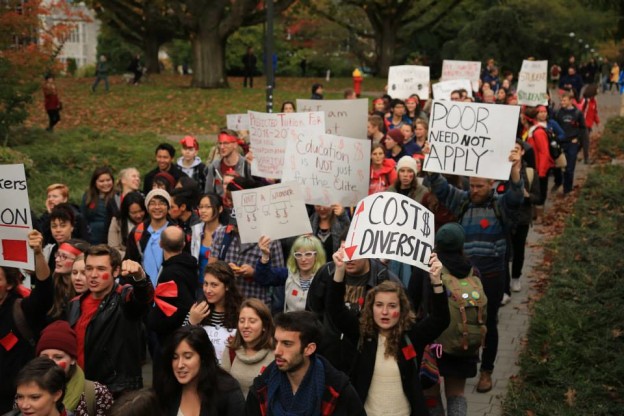Excellence has been the Board of Governors’ word of choice since announcing the implementation of international tuitions increases averaging at 49% over the next three years. But what does the BOG’s vision of excellence really look like and does it foster exclusion?
To date, UBC has published very few statistics on the economic and racial diversity of its student body, of which international students make up 21.4%. This makes it almost impossible to guess which groups will be hit hardest by the Board’s decision. We can however, safely assume that increasing the tuition by such an unreasonable amount will disproportionately affect marginalized groups, making a ‘world class education’ even more inaccessible to many.
This comes as a huge disappointment to those of us who were initially drawn to UBC because of its vibrant and diverse global environment. Isn’t it ironic that the same institution that taught us to celebrate difference is now ignoring it? According to the Ubyssey, the Board and administration have been adamant about their refusal to discuss the necessity of the tuition increases, only allowing discussion on the topic of ‘allocation’ of new ‘revenue’ in their consultations. In doing so, they have both silenced and erased the voices most integral to this debate: those that would have been affected by these tuition hikes. This erasure and the inevitable reduction of difference and diversity to follow will once again impact the range of debates and the quality of knowledge produced on this campus. The progressive and dynamic dialectic space we aim to foster is under even greater threat.
UBC’s Board of Governors has reaffirmed that wealth, not merit, determines which students are able to walk alongside its extravagant buildings and fountains. To be clear, the University is already an incredibly euro-centric and exclusionary institution due to its pricy international and domestic tuitions fees and by nature of its colonial placement on the unceded and occupied land of the xʷməθkʷəy̓əm (Musqueam) people.The most recent hikes show that even being a member of the upper-middle class isn’t enough anymore; in order to attend UBC, future international students will have to be members of the 1% – the global elite. And the Board of Governors’ emphasis on fund allocation, such as the potential expansion of financial aid for a select few international students, fails to address this problem. Scholarships and aid cannot be distributed to everyone and therefore tread dangerously close to tokenism.
It is important for domestic students to note that corporatization does not stop with international tuition. When the tuition cap freeze was lifted in 2002, the cost of tuition for domestic students rose by 22% in just one year, and within three years had almost doubled. The university has a history of lobbying for the “relaxing of” the 2% tuition increase cap which was set to balance the approximate rate of inflation. If the cap were to be lifted today, domestic tuitions in BC would begin to rival those found in the United States, where tuition is notoriously unaffordable.
To a certain extent, the announcement seems logical: faced with increasing provincial cuts to post-secondary education, the University has to generate new revenue somehow. The corporate structure is seen as a viable solution to the Universities’ funding quandary, but when business interests are prioritized, academic values are thrown to the wayside. The University becomes a brand, as evidenced by this webpage, and education is reduced to a mere product.
It’s easy to see why so many of us may be left feeling defeated or demoralized in the wake of last year’s actions. This year’s tuition hikes seem like a slap in the face to many students who feel that they are being ignored or even mocked by the BOG and administration. However, we may not have been thinking big enough.
Appealing to the BOG hasn’t worked. It’s time to start appealing to the community at large and to begin thinking outside the context of our own university. We must understand ourselves as part of a global movement. In Germany a sustained and uncompromising student movement eventually lead to the abandonment of tuition fees, proving once and for all that it’s possible to provide higher education for free. We should stand in solidarity with other students currently mobilizing in the United States, United Kingdom, Australia, South Africa, Chile etc. to demand that education be made affordable to all. Ensuring that future generations have access to higher education is in our own interest, and in the interest of creating a better world.
So how can we resist as students? Well, for starters we can mobilize, both on campus and in our respective cities and communities. Attend on-campus discussions, information sessions and rallies or organize your own event. The first panel discussion will be held on Friday, November 13th in the Atrium of the Student Nest. Remember, action generates press and press leads to political pressure! Write articles, talk to people in your communities, start new initiatives and think outside the box. Spreading information about this issue will make it more visible.
While the Board of Governors may see our protests and rallies as petty squabble, not worthy of their time or attention, other Canadians are likely to sympathize with our concerns. Young people represent a significant constituency in Canada as witnessed during this past election which saw the highest turnout of young Canadian voters in recent memory. Our voices matter, and if the Board of Governors does not agree, let’s prove them wrong!




